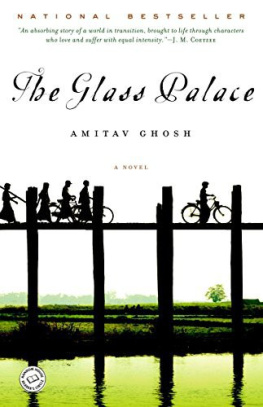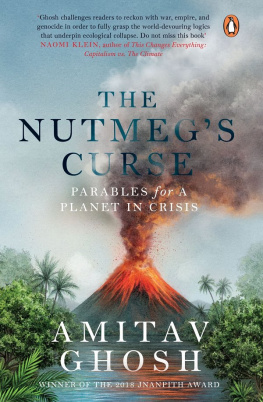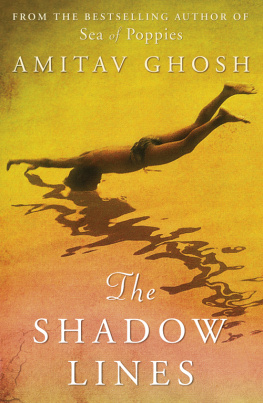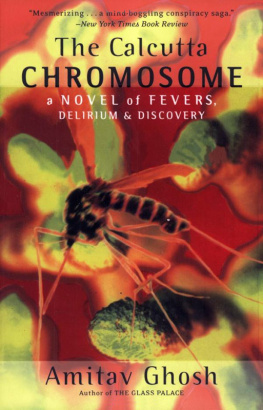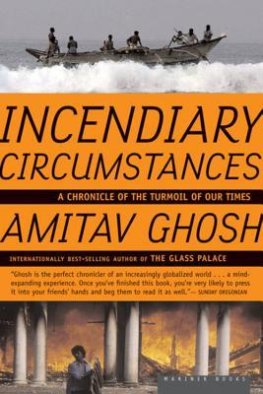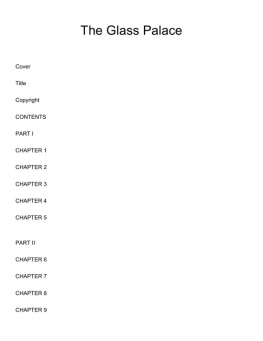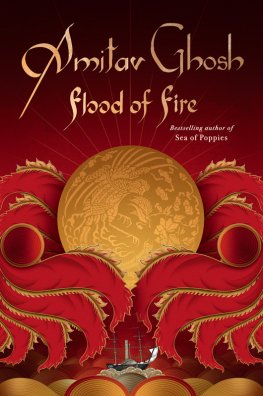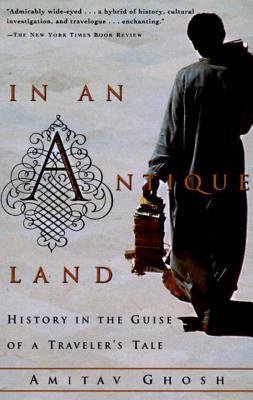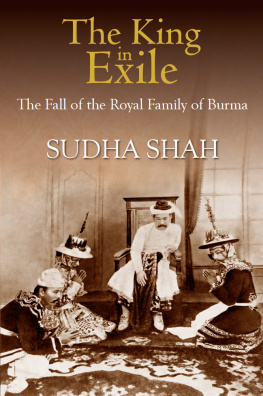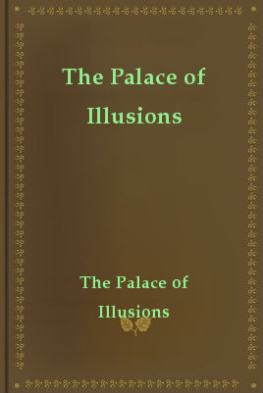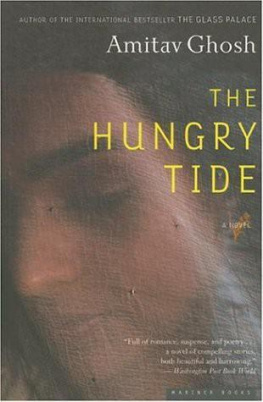T HE G LASS P ALACE
Amitav Ghosh
RANDOM HOUSE NEW YORK
Copyright 2001 by Amitav Ghosh
Map copyright 2001 by Anita Karl and Jim Kemp
All rights reserved under International and Pan-American Copyright Conventions. Published in the United States by Random House, Inc., New York, and simultaneously in Canada by Random House of Canada Limited, Toronto.
R ANDOM H OUSE is a registered trademark of Random House, Inc.
This work was originally published in Great Britain by HarperCollins UK in 2000.
Library of Congress Cataloging-in-Publication Data
Ghosh, Amitav.
The glass palace/Amitav Ghosh.
p. cm.
1. BurmaHistoryFiction. 2. Mandalay (Burma)Fiction. I. Title.
PR9499.3.G536 G58 2000
823'.914dc21 00-41477
Random House website address: randomhousebooks.com
eISBN: 978-0-375-50687-1
v3.0_r3
CONTENTS
PART I
Mandalay
CHAPTER 1
There was only one person in the food-stall who knew exactly what that sound was that was rolling in across the plain, along the silver curve of the Irrawaddy, to the western wall of Mandalays fort. His name was Rajkumar and he was an Indian, a boy of elevennot an authority to be relied upon.
The noise was unfamiliar and unsettling, a distant booming followed by low, stuttering growls. At times it was like the snapping of dry twigs, sudden and unexpected. And then, abruptly, it would change to a deep rumble, shaking the food-stall and rattling its steaming pot of soup. The stall had only two benches, and they were both packed with people, sitting pressed up against each other. It was cold, the start of central Burmas brief but chilly winter, and the sun had not risen high enough yet to burn off the damp mist that had drifted in at dawn from the river. When the first booms reached the stall there was a silence, followed by a flurry of questions and whispered answers. People looked around in bewilderment: What is it? Ba le? What can it be? And then Rajkumars sharp, excited voice cut through the buzz of speculation. English cannon, he said in his fluent but heavily accented Burmese. Theyre shooting somewhere up the river. Heading in this direction.
Frowns appeared on some customers faces as they noted that it was the serving-boy who had spoken and that he was a kalaa from across the seaan Indian, with teeth as white as his eyes and skin the color of polished hardwood. He was standing in the center of the stall, holding a pile of chipped ceramic bowls. He was grinning a little sheepishly, as though embarrassed to parade his precocious knowingness.
His name meant Prince, but he was anything but princely in appearance, with his oil-splashed vest, his untidily knotted longyi and his bare feet with their thick slippers of callused skin. When people asked how old he was he said fifteen, or sometimes eighteen or nineteen, for it gave him a sense of strength and power to be able to exaggerate so wildly, to pass himself off as grown and strong, in body and judgment, when he was, in fact, not much more than a child. But he could have said he was twenty and people would still have believed him, for he was a big, burly boy, taller and broader in the shoulder than many men. And because he was very dark it was hard to tell that his chin was as smooth as the palms of his hands, innocent of all but the faintest trace of fuzz.
It was chance alone that was responsible for Rajkumars presence in Mandalay that November morning. His boatthe sampan on which he worked as a helper and errand-boyhad been found to need repairs after sailing up the Irrawaddy from the Bay of Bengal. The boatowner had taken fright on being told that the work might take as long as a month, possibly even longer. He couldnt afford to feed his crew that long, hed decided: some of them would have to find other jobs. Rajkumar was told to walk to the city, a couple of miles inland. At a bazaar, opposite the west wall of the fort, he was to ask for a woman called Ma Cho. She was half-Indian and she ran a small food-stall; she might have some work for him.
And so it happened that at the age of eleven, walking into the city of Mandalay, Rajkumar saw, for the first time, a straight road. By the sides of the road there were bamboo-walled shacks and palm-thatched shanties, pats of dung and piles of refuse. But the straight course of the roads journey was unsmudged by the clutter that flanked it: it was like a causeway cutting across a choppy sea. Its lines led the eye right through the city, past the bright red walls of the fort to the distant pagodas of Mandalay Hill, shining like a string of white bells upon the slope.
For his age, Rajkumar was well travelled. The boat he worked on was a coastal craft that generally kept to open waters, plying the long length of shore that joined Burma to Bengal. Rajkumar had been to Chittagong and Bassein and any number of towns and villages in between. But in all his travels he had never come across thoroughfares like those in Mandalay. He was accustomed to lanes and alleys that curled endlessly around themselves so that you could never see beyond the next curve. Here was something new: a road that followed a straight, unvarying course, bringing the horizon right into the middle of habitation.
When the forts full immensity revealed itself, Rajkumar came to a halt in the middle of the road. The citadel was a miracle to behold, with its mile-long walls and its immense moat. The crenellated ramparts were almost three storeys high, but of a soaring lightness, red in color, and topped by ornamented gateways with seven-tiered roofs. Long straight roads radiated outwards from the walls, forming a neat geometrical grid. So intriguing was the ordered pattern of these streets that Rajkumar wandered far afield, exploring. It was almost dark by the time he remembered why hed been sent to the city. He made his way back to the forts western wall and asked for Ma Cho.
Ma Cho?
She has a stall where she sells food baya-gyaw and other things. Shes half Indian.
Ah, Ma Cho. It made sense that this ragged-looking Indian boy was looking for Ma Cho: she often had Indian strays working at her stall. There she is, the thin one.
Ma Cho was small and harried-looking, with spirals of wiry hair hanging over her forehead, like a fringed awning. She was in her mid-thirties, more Burmese than Indian in appearance. She was busy frying vegetables, squinting at the smoking oil from the shelter of an upthrust arm. She glared at Rajkumar suspiciously. What do you want?
He had just begun to explain about the boat and the repairs and wanting a job for a few weeks when she interrupted him. She began to shout at the top of her voice, with her eyes closed: What do you thinkI have jobs under my armpits, to pluck out and hand to you? Last week a boy ran away with two of my pots. Whos to tell me you wont do the same? And so on.
Rajkumar understood that this outburst was not aimed directly at him: that it had more to do with the dust, the splattering oil, and the price of vegetables than with his own presence or with anything he had said. He lowered his eyes and stood there stoically, kicking the dust until she was done.
She paused, panting, and looked him over. Who are your parents? she said at last, wiping her streaming forehead on the sleeve of her sweat-stained aingyi.
I dont have any. They died.
She thought this over, biting her lip. All right. Get to work, but remember, youre not going to get much more than three meals and a place to sleep.

